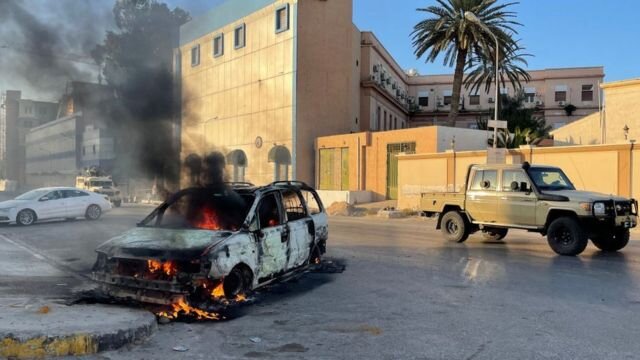Libya sees deadly clashes

Deadly fighting broke out between what is strongly believed to be forces loyal to rival governments in Libya; raising fears a bigger conflict breaking out eleven years after NATO attacked the country.
According to medical officials, at least 32 people have died in the latest bout of violence and some 159 others have sustained injuries during the unrest.
Forces loyal to the Tripoli-based Government of National Accord (GNA), led by Abdul Hamid Dbeibeh exchanged heavy fire with armed groups backed by Fathi Bashagha who heads a rival government in the country’s east.
According to the GNA health ministry, six hospitals were hit and ambulances were unable to reach areas affected by the clashes.
The United Nations Children's Fund (UNICEF) in Libya says the clashes that took place in the capital, Tripoli, have damaged at least four medical centers, including a maternity hospital. In a statement published on social media, UNICEF stressed the need to protect civilians, medical facilities, and individuals.
Bashagha was selected last February to be interim Prime Minister by Libya’s House of Representatives. The selection was made after Dbeibeh’s government failed to organize national elections in December 2021 as per the UN-led peace plan. However, Dbeibeh refused to cede power which has now led to more than one attempt by Bashagha to enter the capital city.
The parliament said Dbeibah's mandate had expired and it appointed Bashagha to take over. However, Dbeibah argues parliament has no right to replace him and he would step down only after elections.
The offices of the two leaders accused each other of responsibility for the violence. Peace remains difficult to find in Libya as the political stalemate continues.
The escalation threatens to shatter the quiet relative calm Libya has seen over the last two years. The oil-rich nation was sent into crisis after NATO intervened to topple Muammar Gaddafi in 2011. The former longtime ruler was killed in the same year by NATO-led Libyan armed groups on the ground.
Anti-war activists joined a long line of people including different politicians at the time warning that NATO is unable to bring peace to the country and accused the North Atlantic military alliance of having one eye on the country’s oil in a similar fashion to Iraq.
There was little opposition to the removal of Gaddafi but there was plenty of opposition to his removal by the U.S., the UK, and France with many saying that should be left to the locals without Western interference and many of those views at the time have turned out true eleven years later.
NATO failed to seek the safety of Libyans when it attacked their country as the aftermath of the intervention shows and it is the Libyan people who have suffered since because of the North Atlantic Alliance.
The NATO intervention saw an increase in terrorist activity in the country including the presence of Daesh which the Libyan people fought out on their own. Then the political infighting took center stage and the country has not seen any political stability and real functioning services until this very day.
Leave a Comment